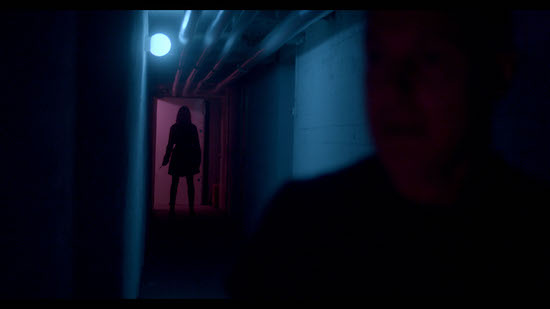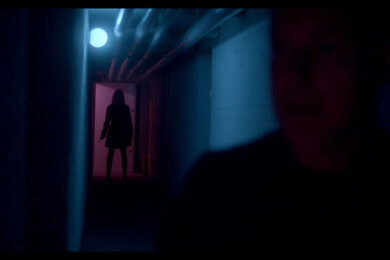Videoman
Horror used to be a pariah, now it’s big business. The Blumhouse Productions model – give a young director a comparatively low budget and more-or-less creative freedom; pump cash into the advertising and utilise major studio distribution – has helped turn the genre into one of the most profitable in Hollywood. At the same time, indie horror is sweeping up awards through the likes of Julia Ducournau’s excellent Raw and this year’s Hereditary. Sometimes the two camps collide: Jordan Peele’s Get Out was itself a Blumhouse feature.
FrightFest, the UK’s biggest horror film festival, positions itself between these two camps. By its nature it has to be diverse – five days and as many screens is a lot to fill, after all. Because of that, it’s the best place to gauge the current climate of the genre. While you can see ‘mainstream’ horror here – Pascal Laugier’s Incident In A Ghostland, Gaspar Noé’s deeply unsettling Climax and cyberpunk thriller Upgrade being the most notable this time around – it’s also a chance to catch a vast array of unreleased and upcoming films. The features that bookended Ghostland on the Friday night, for instance, were Franck Ribière’s emotive biopic of Grand Guignol actress Paula Maxa, The Most Assassinated Woman In The World and Boar – about a pig the size of a tank (never explained) that stomps and chomps its way through an Australian town, while the cast engage in amusingly parochial banter.
Jenn Wexler’s The Ranger opens the festival – the first time a female director has had the honour (and one of only a few features on the bill directed by a woman, through the proportion is higher in the short film programme). It’s a punchy punksploitation thriller set in the mid-80s. Chelsea (The Defenders’ Chloe Levine) goes on the run with her scummy boyfriend and some friends after they do over a cop. Hiding out in the woods, the gang fall foul of a deranged park ranger (Jeremy Holm) who despatches the teens in a variety of gruesome ways while delivering amusing one-liners. It’s derivative as hell, nodding back to classic slashers as well as the likes of Green Room and Bad Lieutenant, but it looks great with Wexler and cinematographer James Siewert making the most of the lush green forest. It’s also very satisfying watching Chelsea’s shitty pals get killed off one by one – littering a national park? They deserve everything they get.
The 80s thing is looking rather overdone these days, though. Summer of 84 (which immediately followed) is an entertaining, but resolutely derivative mystery thriller from the directorial trio behind 2015’s Turbo Kid. The de rigueur gang of teen misfits uncover a mystery in their home town in a picture that feels rather cynically targeted at the Stranger Things crowd. The cinematic equivalent of that Muse album cover, it’s a film in love with the genre that adds nothing new to it. Elsewhere, the long-in-production stop-motion animation Chuck Steel: Night Of The Trampires centres on an 80s-style action hero, while Puppet Master: The Littlest Reich is the latest throwback sequel to a franchise that began in 1989.
Much better than any of these is Kristian A. Söderström’s Videoman, tucked away on the Discovery screen opposite the buzzy Argentinian ghost story, Terrified. While set in the present day, both of Videoman’s ageing protagonists are obsessed with the 80s. Stefan Sauk’s Ennio is an embittered former video store owner, still obsessively curating his collection of mouldering tapes, while Lena Nilsson’s Simone is an alcoholic who fantasises of being a pop star, ala Cyndi Lauper. Söderström’s film is drenched in the neon colours of the video era and has the synthwave soundtrack you’d expect, but it’s a tender and nuanced tale that both pays homage to horror’s VHS golden age while being critical of unthinking nostalgia.
Returning to The Ranger, it was part of another, more welcome, trend. This year saw a noticeable increase in LGBT characters in non-trivial roles. Wexlers’ gay couple fare as badly as almost everyone else – equality of a sort, we suppose – but elsewhere the surprisingly ace horror comedy Ravers (think Shaun of the Dead with a pounding, near-constant techno soundtrack and some superb practical gore from effects genius Dan Martin) gave us a lesbian hero and succeeded in neither fridging her or her girlfriends.
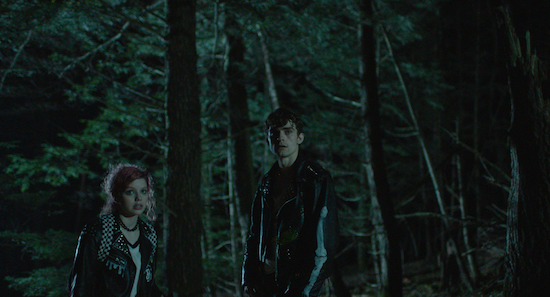
The Ranger
Elsewhere the terrific zombie musical Anna and the Apocalypse (Buffy’s Once More With Feeling set in a rundown Scottish town with Paul Kaye hissing and gurning through his role as an evil headmaster) and Climax both prominently feature gay characters, while Colin Minahan’s tense thriller, What Keeps You Alive studies spousal abuse as Jules (Brittany Allen) and her wife Jackie (Hannah Emily Anderson) head out to the proverbial cabin in the woods only for things to take a nasty turn. There’s still a long way to go in terms of representation, but it’s gratifying to see a change for the better.
Rather less enlightened was Incident In A Ghostland, an effective but troubling home invasion thriller. Beth (played in different time periods by Emilia Jones and Crystal Reed) is a young writer in thrall to HP Lovecraft – does any genre have quite such a love affair with its own history as horror? – who moves with her mother (Mylène Farmer) and sister Vera (Taylor Hickson and Anastasia Phillips) to her dead aunt’s old house; a mansion full of spooky dolls and weird artefacts that, in the film’s funniest moments, gaze malevolently out at the audience from the side of the frame while the two siblings bicker. It’s not long, however, before a sinister pair in an ice cream truck show up, attack the mum and imprison the girls. Trapped in the cellar, they are beaten, burned and humiliated in a relentless middle act that’s undeniably powerful, but also quite difficult to stomach.
As a piece of horror filmmaking it’s accomplished, but there’s the whiff of retrograde nastiness to Ghostland. It’s not just the solid 30-minutes or so that involves a teenage girl being physically and psychologically tormented – honestly, we expected that from the director of Martyrs and it’s well-executed here, with a satisfying payoff – but the perpetrators of the cruelty: a mentally ill man and a trans woman, simply referred to as the Ogre and the Witch.
Now, arguably basement-dwelling creeps who think of women as dolls to be played with are the villains of the internet age, but the evil gender non-conformist is a tired horror cliché at the best of times, which 2018 is not. At a charitable stretch you could see the character as a nod to the Sleepaway Camp series, but given it’s her only characteristic, it feels more like old school transphobia.
It was a strong year for homegrown genre fare, with Garth Marenghi writer and star Matthew Holness turning in one of the festival’s most intense and original features. Possum follows two puppet-makers (Sean Harris and Alun Armstrong), a nephew and uncle whose strained relationship is reflected in the methodical pacing. The spectre of abuse hangs over the film, while the title character – a grotesque spider puppet is a thrillingly eerie creation. Holness gets extra points for recruiting the resurgent Radiophonic Workshop to score his nightmarish vision.
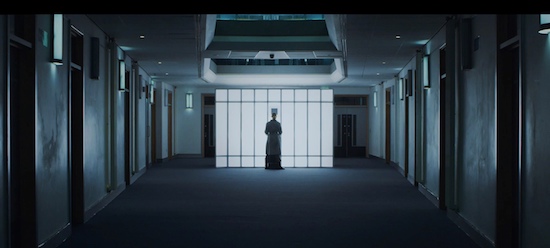
White Chamber
Paul Rashid’s White Chamber has a small budget, but it’s been wisely invested in hiring a cast who bring a real anger and urgency to an examination of the morality of torture. Set in a dystopian England riven by war, a group of scientists are trialling new interrogation methods on political prisoners. Elle (Shauna Macdonald) wakes up in a gleaming white room and her trial begins – but as the film gradually reveals, she is far from the innocent she claims to be. A hybrid of Cube and V For Vendetta, Rashid’s film says a lot with a little.
Johnny Kevorkian’s Await Further Instructions is another claustrophobic character piece. A young couple, Nick (Sam Gittins) takes his girlfriend Annji (Neerja Naik) to visit his estranged family and his granddad – played with malicious glee by Game of Thrones/Harry Potter’s David Bradley – stirs up racial tension in the house, that quickly explodes into violence when the family are trapped indoors together. It all goes a bit Videodrome in its second half, where it also benefits from the Dan Martin touch, but it’s in the building paranoia – and surprising streak of humour – of the first hour that the film is at its best.
One of the most talked about films of the festival was Tigers Are Not Afraid – Issa López’s stark exploration of poverty, gang culture and ghosts in present day Mexico. Estrella (Paola Lara) has lost her mum to brutal cartel, the Huascas. Shine (Juan Ramón López) has stolen one of the cartel thug’s phone, little realising that it holds incriminating footage that the Huascas will do anything to get back. The two kids join forces, but the – literal – ghosts of Estrella’s past have been stirred up and threaten them all…
Like Babak Anvari’s Under The Shadow or Pan’s Labyrinth (which had its UK premiere at FrightFest back in 2006), Tigers uses the fantastic as a way to explore real world horrors. This is a Mexico where cops are too afraid of the cartels to intervene and where the most frightening moment in the film isn’t a haunting, but a school shooting. It’s an unflinchingly bleak piece of cinema, but López still finds hope in her young heroes’ courage and loyalty.
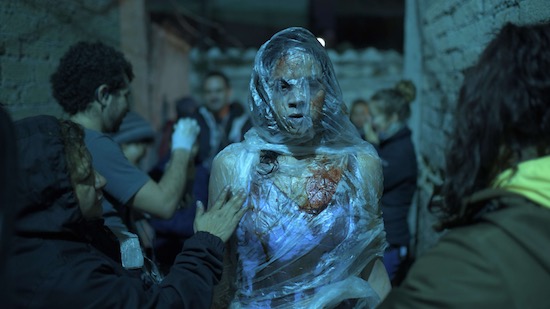
Tigers Are Not Afraid
My own personal festival highlight doesn’t conform to any movie trends and you could make a case that it isn’t even horror – although it does feature a scene where a monster vomits into Sam Elliott’s open mouth. The Man Who Killed Hitler And Then The Bigfoot sounds like a b-movie, but it’s something far stranger.
Set in the 40s and the late 80s (that decade again, though Robert D. Krzykowski’s feature debut has little interest in the era), it’s the story of Calvin Barr (played in subtly different registers by Elliott and Poldark’s Aidan Turner), a retired American soldier. In the 40s Barr loved and lost a girl, Maxine (Caitlin Fitzgerald) and, uh, covertly assassinated the Fuhrer. Still grief-stricken and convinced that his life has meant nothing, he’s talked back into one final act of service for the government – track down and kill the plague-spreading Bigfoot.
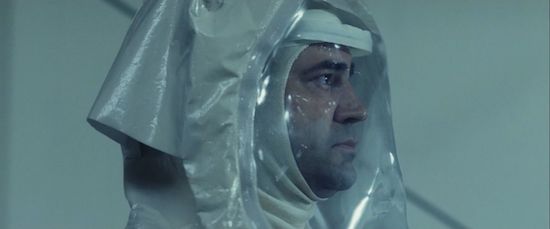
The Man Who Killed Hitler and Then Bigfoot
It’s a goofy premise, but the joy of the film is in both its sincere emotional stakes – Elliott’s performance is restrained and dignified – and its sense of humour; at one point a Nazi checks his wristwatch, which has a swastika in place of a second hand. Spielberg is a clear influence, but the considered pacing, intense focus on Barr’s inner life and its disregard for genre conventions mark this out as something new and fascinating.
FrightFest is a delirious experience. For five days your world is focussed on three locations: two cinemas and The Imperial round the corner, where folk congregate between movies. But it’s also one of the friendliest film events around. There’s not a hint of the elitism or snobbery you might associate with the festival circuit and while there’s bound to be something that you miss – despite several screenings across the weekend I never did catch word-of-mouth zombie hit, One Cut Of The Dead – you’ll at least come away with a lot more films on your Must Watch list.

